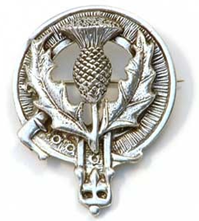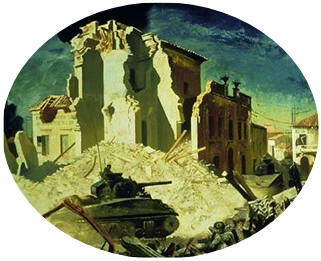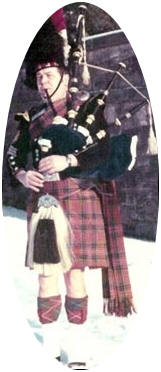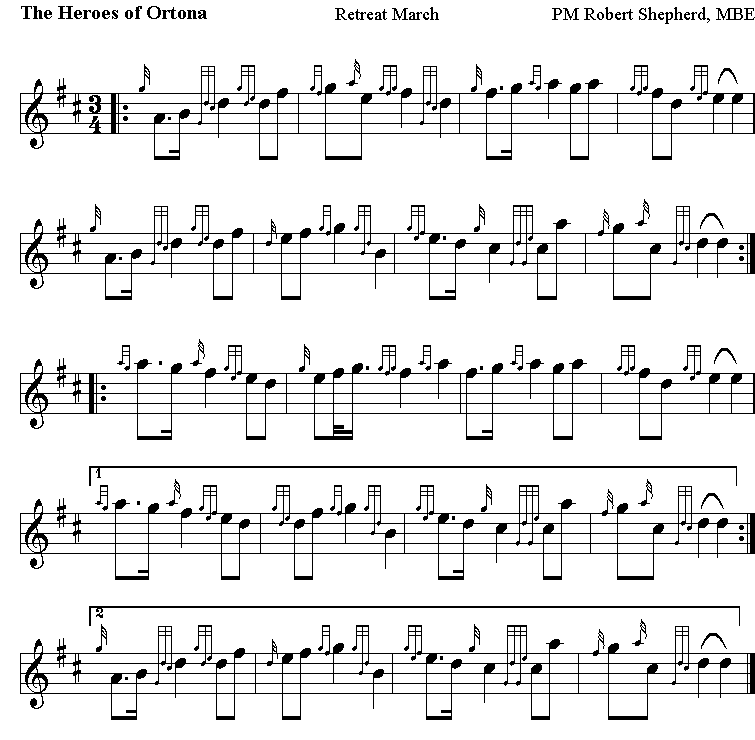 |
||

Best viewed in
|
The Battle of Ortona (December 20, 1943 to December 27, 1943) was a small yet extremely fierce battle fought between German Fallschirmjäger (paratroops), and assaulting Canadian forces from the 1st Canadian Division. It was considered among Canada's greatest achievements during the war. Taking place in the small Adriatic Sea town of Ortona, with its tiny peacetime population of 10 000, the battle was the site of what were perhaps the deadliest close quarter combat engagements of the entire war. Some dubbed this "Little Stalingrad". Ortona was a town of strategic importance due to its deep-sea port. It was also well surrounded by cliffs on the east and north, and deep ravine on the west. This made Ortona almost impregnable, the only option for an assault would be from the south, which offered the only entrance point. Ortona also constituted part of the "Winter Line", and the Germans were ordered to "fight for every last house and tree". The Canadians faced a unit from the German 1st Parachute Division. These soldiers were battle-hardened after years of war, and were ordered by Hitler to defend Ortona at any cost. The Germans had placed various barricades and left rubble strewn throughout the narrow side streets surrounding the Piazza Municipale. The only available route for the Canadian tanks was through the Corso Vittorio, which was booby trapped; traps would serve the Germans with deadly efficiency during the 8 days of bitter fighting. After 8 days of fighting, the attrited German troops who lacked reinforcements finally surrendered the town and retreated. The Canadians suffered 1374 dead in the fighting in and around Ortona, almost 25% of all Canadians killed during the Italian Campaign.
Robert "Bob" Shepherd (above) grew up in post-war Lochore, Fife, in a region of mining communities where every colliery had its pipe band and brass band. Consequently youngsters had a choice to learn the pipes or join the brass band. After first of all learning the piano and with the influence of his grandfather, Bob Shepherd took his first piping lesson as a 10-year old member of Lochore Juvenile pipe band under Pipe Major H MacPherson. At the age of 14, Bob Shepherd joined the Dundonald Colliery Pipe Band (later became Dysart & Dundonald Pipe Band) and took solo instruction from Walter Drysdale. Around the age of 18 or 19 he gave up piping for other pursuits, including finding a profession and completing National Service with the Royal Electrical and Mechanical Engineers. After completing teachers training at Moray House Bob was appointed as a maths teacher at Ballingry School, in the Lochore area. This coincided with the virtual demise of the Dysart and Dundonald Pipe Band. The committee asked Bob Shepherd to take over. He resolved to resurrect the band and keep piping in the community, and begun teaching youngsters during school lunchtimes and after school. The first taste of success came in 1968 when the band took 1st in the Grade 3 at Dunblane Highland Gathering. Two years later in 1970 the band were promoted to Grade 2, after winning the Champions of Champions title for Grade 3. That was quickly followed by the Grade 2 Champion of Champions title in 1971. In 1973, Dysart and Dundonald began to make its mark in Grade 1, culminating in winning the World Pipe Championship in 1977 and again in 1978. In 11 years Bob Shepherd, by teaching local youngsters had taken a virtually defunct colliery pipe band to the very top --- a remarkable feat. He continued teaching the bagpipes during his spare time at Ballingry J. H. School achieving success in the Novice and Juvenile grades as well as in Grade 1 with Dysart & Dundonald. Eventually in 1987 with the closing of Ballingry J.H. and the creation of a new High School situated in Lochgelly, he was appointed the first full time Piping instructor for Fife Region based in Lochgelly. Bob became famous world wide for his informative seminars on all aspects of the pipe band including adjudication. He has adjudicated and delivered seminars all over Europe and in Canada, America, Australia, New Zealand and South Africa. His unique method of teaching is illustrated in his tutor book “ LEARN TO PLAY THE BAGPIPES” which is the basis used in his most recent work “Language of Music” in 2005. The “Language of Music” programme was developed for the Royal Scottish Pipe Band Association by the Academy of Pipe Band Musicianship as a teaching aid directed at Grade 4 and Novice Juvenile Pipe Bands and will be implemented in 2006 for the first time. On the 10th October 2002 he was invested at Buckingham Palace with the MBE (Member of the British Empire) for services to Piping and Teaching. His is also the founder of "R.T. Shepherd & Sons" company which created the first completely synthetic drone reed.
|
|


